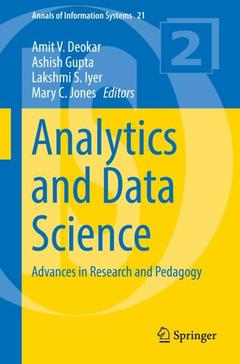Description
Analytics and Data Science, 1st ed. 2018
Advances in Research and Pedagogy
Annals of Information Systems Series, Vol. 21
Coordinators: Deokar Amit V., Gupta Ashish, Iyer Lakshmi S., Jones Mary C.
Language: English
Subject for Analytics and Data Science:
Support: Print on demand
Description
/li>Contents
/li>Biography
/li>Comment
/li>
This book explores emerging research and pedagogy in analytics and data science that have become core to many businesses as they work to derive value from data. The chapters examine the role of analytics and data science to create, spread, develop and utilize analytics applications for practice. Selected chapters provide a good balance between discussing research advances and pedagogical tools in key topic areas in analytics and data science in a systematic manner. This book also focuses on several business applications of these emerging technologies in decision making, i.e., business analytics. The chapters in Analytics and Data Science: Advances in Research and Pedagogy are written by leading academics and practitioners that participated at the Business Analytics Congress 2015.
Applications of analytics and data science technologies in various domains are still evolving. For instance, the explosive growth in big data and social media analytics requires examination of the impact of these technologies and applications on business and society. As organizations in various sectors formulate their IT strategies and investments, it is imperative to understand how various analytics and data science approaches contribute to the improvements in organizational information processing and decision making. Recent advances in computational capacities coupled by improvements in areas such as data warehousing, big data, analytics, semantics, predictive and descriptive analytics, visualization, and real-time analytics have particularly strong implications on the growth of analytics and data science.
Chapter 1. Exploring the Analytics Frontiers through Research and Pedagogy.- Amit V. Deokar, Ashish Gupta, Lakshmi Iyer, and Mary C. Jones.- Chapter 2. Introduction: Research and Research-in-Progress.- Anna Sidorova, Babita Gupta, and Barbara Dinter.- Chapter 3. Business Intelligence Capabilities.- Thiagarajan Ramakrishnan, Jiban Khuntia, Terence Saldanha, and Abhishek Kathuria.- Chapter 4. Big Data Capabilities: An Organizational Information Processing Perspective.- Öykü Isik.- Chapter 5. Business Analytics Capabilities and Use: A Value Chain Perspective.- Rudolph T. Bedeley, Torupallab Ghoshal, Lakshmi S. Iyer, and Joyendu Bhadury.- Chapter 6. Critical Value Factors in Business Intelligence Systems Implementations.- Paul P. Dooley, Yair Levy, Raymond A. Hackney, and James L. Parrish.- Chapter 7. Business Intelligence Systems Use in Chinese Organizations.- Yutong Song, David Arnott, and Shijia Gao.- Chapter 8. The Impact of Customer Reviews on Product Innovation: Empirical Evidence in Mobile Apps.- Zhilei Qiao, G. Alan Wang, Mi Zhou, and Weiguo Fan.- Chapter 9. Whispering on Social Media.- Juheng Zhang.- Chapter 10. Does Social Media Reflect Metropolitan Attractiveness? Behavioral Information from Twitter Activity in Urban Areas.- Johannes Bendler, Tobias Brandt, and Dirk Neumann.- Chapter 11. The Competitive Landscape of Mobile Communications Industry in Canada – Predictive Analytic Modeling with Google Trends and Twitter.- Michal Szczech and Ozgur Turetken.- Chapter 12. Scale Development Using Twitter Data: Applying Contemporary Natural Language Processing Methods in IS Research.- David Agogo and Traci J. Hess.- Chapter 13. Information Privacy on Online Social Networks: Illusion-in-Progress in the Age of Big Data?.- Shwadhin Sharma and Babita Gupta.- Chapter 14. Online Information Processing of Scent-Related Words and Implications for Decision Making.- Meng-Hsien (Jenny) Lin, Samantha N.N. Cross, William J. Jones, and Terry L. Childers.- Chapter 15. Say It Right: IS Prototype to Enable Evidence-Based Communication Using Big Data.- Simon Alfano.- Chapter 16. Introduction: Pedagogy in Analytics and Data Science.- Nicholas Evangelopoulos, Joseph W. Clark, and Sule Balkan.- Chapter 17. Tools for Academic Business Intelligence & Analytics Teaching – Results of an Evaluation.- Christoph Kollwitz, Barbara Dinter, and Robert Krawatzeck.- Chapter 18. Neural Net Tutorial.- Brian R. Huguenard, and Deborah J. Ballou.- Chapter 19. An Examination of ERP Learning Outcomes: A Text Mining Approach.- Mary M. Dunaway.- Chapter 20. Data Science for All: A University-Wide Course in Data Literacy.- David Schuff.
Amit V. Deokaris an Assistant Professor of Management Information Systems in the Robert J. Manning School of Business at the University of Massachusetts Lowell. Dr. Deokar received his PhD in Management Information Systems from the University of Arizona. He also earned a MS in Industrial Engineering from the University of Arizona and a BE in Mechanical Engineering from VJTI, University of Mumbai. His research interests include data analytics, enterprise data management, business intelligence, business process management, and collaboration processes. His work has been published in journals such as Journal of Management Information Systems, Decision Support Systems (DSS), The DATA BASE for Advances in Information Systems, Information Systems Frontiers, Business Process Management Journal (BPMJ) and IEEE Transactions. He is currently a member of the editorial board of DSS and BPMJ journals. He has been serving as the Decision Support and Analytics Track Chair at the international AMCIS 2014-17 conferences, and is currently the Chair-Elect of the AIS Special Interest Group on Decision Support and Analytics (SIGDSA). He was recognized with the 2014 IBM Faculty Award for his research and teaching in the areas of analytics and big data.
Ashish Gupta is an Associate Professor of Analytics in Raymond J. Harbert College of Business at the Auburn University. Prior to this, he served as the (founding) director of Analytics Research Center and an Associate Professor of Analytics & IS in the College of Business at the University of Tennessee Chattanooga. He has been a Visiting Research Scientist at the Mayo Clinic Rochester, Visiting Associate Professor in Biomedical Informatics at the Arizona State University and research affiliate with University of Tennessee Health Science Center in Memphis. He has a PhD in MSIS from Spears School of Business at Oklahoma State University. Dr. G
Explores the latest advances in research and pedagogy for analytics and data science
Examines how analytics and data science approaches contribute to improved organizational information processing and decision making
Chapters are written by leading academics and practitioners in the field




